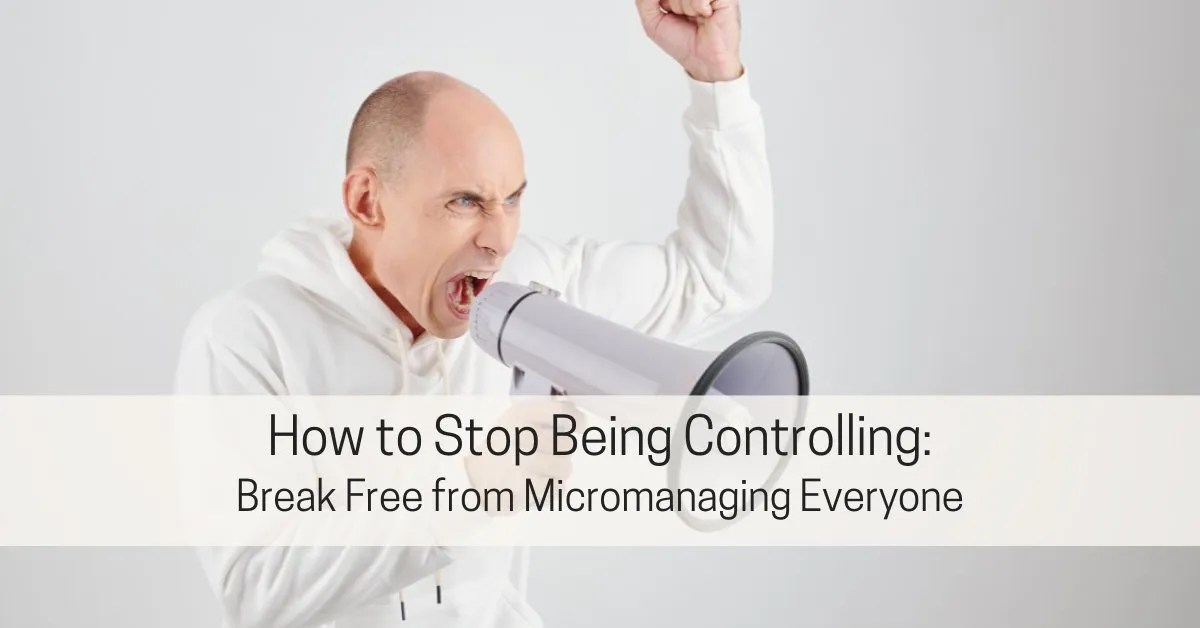If you’re wondering how to stop being controlling, you’re not alone. Many people feel compelled to manage every detail of situations and other people’s choices. For example, you might feel anxious when someone else is driving, find yourself redoing tasks that others have already completed, or feel the urge to jump in with suggestions even when no one asked. These are all signs that you might be a “control freak,” and learning how to stop being controlling could transform your relationships and reduce your stress.
Why We’re Controlling
Most controlling behavior isn’t about being bossy or malicious. It usually comes from anxiety, fear, or past experiences where being in control felt like the only way to stay safe. Maybe you grew up in chaos and learned that taking charge prevented disasters. Or perhaps you’re naturally detail-oriented in a world that often feels unpredictable.
The problem isn’t having high standards—it’s when your need for control starts requiring other people to change their behavior just to make you comfortable.
When High Standards Become Rigid and Problematic
Having high standards isn’t inherently bad—the problem arises when those standards become rigid and inflexible, creating unrealistic expectations for yourself and others.
Healthy high standards are adaptable. You strive for quality but can roll with changes when circumstances shift. You recognize that “good” can take different forms.
Problematic rigidity happens when your standards become non-negotiable rules that everyone must follow. You insist there’s only one “right” way to do things, become genuinely upset when others don’t meet your exact specifications, or feel anxious when processes don’t match your preferences. This rigidity often masks deeper fears about chaos or failure.
The key difference is that flexible standards focus on achieving good outcomes through various means, while rigid standards demand specific processes, regardless of whether they actually improve results. When your high standards require constant vigilance over other people’s choices, they’ve crossed into harmful territory.
Why Control Issues Destroy Relationships
Control issues erode trust and respect. In romantic relationships, your partner may start to feel like a child rather than an equal. They begin hiding things from you or stop sharing ideas because they feel constantly judged. They may stop doing household chores because you constantly criticize their work.
Friends may gradually pull away because spending time with you feels like work. At work, people stop taking initiative because they’re afraid of your reactions.
Ironically, controlling behavior often creates the very chaos and distance it’s trying to prevent.
7 Practical Ways to Stop Being Controlling
1. Use the 1-10 importance scale. Before jumping in, rate the situation’s actual importance. If it’s below 7, practice letting it go. Most things we want to control are actually 3s disguised as 10s by our anxiety.
2. Practice in low-stakes situations. Let others choose the restaurant or handle the grocery run. Start small and build your tolerance for different approaches.
3. Create a “control budget.” Pick 2-3 things that truly matter to you and stay hands-off everything else. You can’t control everything, so choose wisely.
4. Set observation-only times. When you feel the urge to intervene, tell yourself you’re in “researcher mode.” Watch how things unfold. You’ll often discover people are more capable than you assumed.
5. Embrace “good enough.” Stop at 80% instead of pushing for 100%. The discomfort you feel with imperfection is just anxiety—it won’t actually hurt you. In “The CBT Workbook for Perfectionism” I talk about how perfectionism tricks us into believing that anything less than our exact vision equals failure. But the truth is, most outcomes exist on a spectrum—and ‘different’ doesn’t automatically mean ‘worse.’
6. Change how you communicate. Use “I’m wondering if we might try…” instead of “You should…” Frame requests as your preferences, not their failings.
7. Try this mantra: “My way isn’t the only way or the best way.” This simple phrase can interrupt the controlling impulse before it takes over.
8. Embrace a growth mindset that allows for different approaches. Instead of seeing variations from your method as wrong, get curious about them. Most of the time, there are multiple paths to good outcomes—your anxiety just makes it feel like only your way will work.
Start Small, Win Big
Learning to let go of control is like building any other skill—it takes practice. Start with something simple. Let your partner load the dishwasher their way. Notice that the dishes still get clean. Or, if they don’t, let your partner figure that out for themselves and make adjustments. And remember, in the grand scheme of things, this is not an important issue worth ruining your relationship over.
You don’t have to stop caring about outcomes. The goal is to care about them in a way that doesn’t exhaust you or damage your relationships. When you stop trying to control everything, you free up energy for what actually matters.
Dive Deeper
Ready to dive deeper into perfectionism and control issues? My book, “The CBT Workbook for Perfectionism,” offers evidence-based skills to help you overcome self-criticism, cultivate self-esteem, and achieve a balanced life.
©2025 Dr. Sharon Martin, LCSW. All rights reserved. Photos courtesy of Canva.com.
Related Articles
Publisher: Source link





